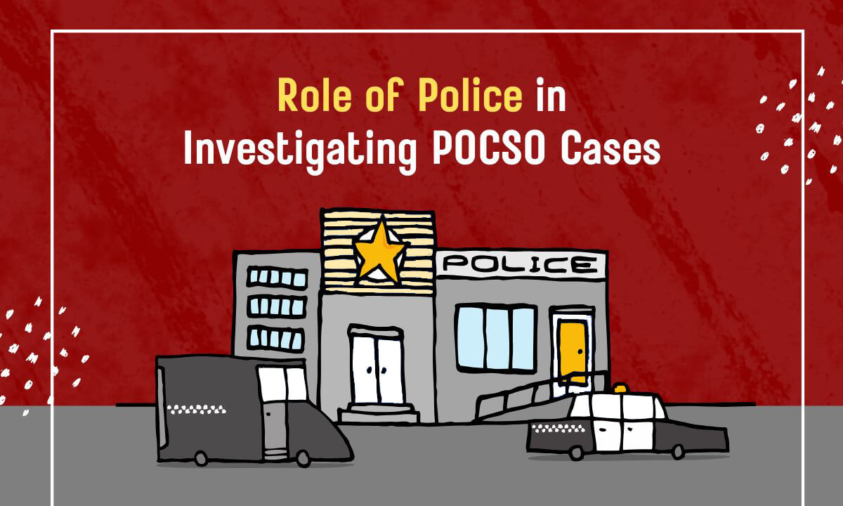Explore how police play a critical role in POCSO case investigations—from child-friendly protocols to time-bound legal processes and survivor protection.
“When a child trusts the system, justice begins with the uniform they first report to.”
INTRODUCTION
The Protection of Children from Sexual Offences (POCSO) Act, enacted in 2012, places the child at the center of the legal process. But while laws offer structure, it is often the police who serve as the first line of action—the bridge between a child’s disclosure and the legal system’s wheels turning.
Police officers are more than enforcers in POCSO cases; they are first responders, evidence collectors, protectors, and often, emotional anchors. This blog explores how law enforcement shapes the trajectory of a POCSO case and what is needed to empower them further.
First Response and FIR Registration
When a child or guardian approaches the police, immediate sensitivity is critical. Under Section 19 of the POCSO Act:
- Any person (including police) who has knowledge of a sexual offence against a child is legally bound to report it.
- The police must record the child’s statement in simple language, preferably by a woman officer, and at the child’s residence or a place of their choosing.
Filing an FIR (First Information Report) is not optional; delays or refusals can amount to dereliction of duty. The National Commission for Protection of Child Rights (NCPCR) has emphasized this in its model guidelines for POCSO implementation.
Ensuring Child-Friendly Procedures
To prevent secondary trauma, police officers must adopt child-sensitive investigation techniques:
- Avoid uniforms if it intimidates the child.
- Use non-threatening language during questioning.
- Refrain from repeated interviews that could re-traumatize the child.
Some states have established Child-Friendly Police Stations, equipped with toys, books, and dedicated officers trained in handling child abuse cases. For example, Maharashtra and Kerala have piloted such stations with positive feedback from child rights activists.
Gathering Medical and Forensic Evidence
The police must immediately:
- Facilitate a medical examination of the child within 24 hours.
- Ensure the examination is conducted by a female doctor, with the guardian or trusted adult present.
- Safeguard any evidence such as clothing, digital devices, or location details.
Under Section 27 of the POCSO Act, the consent of the child and the presence of a support person during medical and forensic procedures are vital. Mishandling this stage can severely weaken a case in court.
Arrest and Interrogation of the Accused
After a preliminary inquiry, police are empowered to:
- Arrest the accused if credible evidence is found.
- File a charge sheet within 90 days, as mandated by POCSO.
Care must be taken to protect the child from direct or indirect contact with the accused, even in custody situations. Bail hearings must factor in the child’s safety, and officers may need to testify during those proceedings.
Coordination with Child Welfare Committees (CWCs)
Under the Juvenile Justice (Care and Protection) Act, police must:
- Produce the child before the Child Welfare Committee within 24 hours.
- Ensure the child is placed in a safe shelter or with a fit person, if home isn’t secure.
CWCs and police must coordinate closely to ensure child protection, counseling, and interim care, especially when the abuser is a family member or guardian.
Liaising with Support Services and NGOs
Police investigations are more effective when integrated with support services:
- Some NGOs assist in child counseling and legal aid.
- Childline (1098) often partners with police to rescue and refer children in danger.
- Support persons appointed under Section 39 of POCSO Act as liaisons between the police, the child, and the court.
Trained officers recognize the value of this ecosystem and actively engage NGOs for trauma support, follow-up care, and victim assistance.
Role in Trial Preparation and Testimony
As the case moves to court, the police’s role doesn’t end:
- They assist prosecutors with evidence collation and witness preparation.
- They escort children safely to court and liaise with judges to ensure in-camera trials.
- Officers may also be called upon to testify, and their reports can influence conviction outcomes.
A weak investigation or poorly documented evidence can lead to acquittals, highlighting the need for detailed, trauma-sensitive police reports.
Training and Challenges
Despite clear guidelines, challenges persist:
- Many officers lack formal training in POCSO and child psychology.
- High caseloads and lack of infrastructure delay investigations.
- Cultural taboos and fear of community backlash sometimes discourage proactive policing.
Efforts by institutions like the Bureau of Police Research & Development (BPR&D) and state training academies have made progress, but much more is needed—especially in Tier-2 and rural areas.
Final Thoughts
In POCSO cases, justice begins with the police report. The way a child is treated in those first 48 hours can set the tone for everything that follows—from healing to the courtroom outcome. Empowering the police through training, accountability, and resources isn’t just about enforcing law—it’s about protecting childhood.
In case you are looking for customized child safety training, POCSO-related training, or POCSO advisory services, please feel free to reach out to us at +919004521614 or [email protected].
Authored by Tanvi Ojha, Content Writer Intern


 Cart is empty
Cart is empty 
